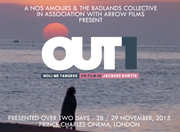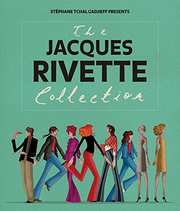Review for The Jacques Rivette Collection
‘The Jacques Rivette Collection’ is a bit of a strange release for Arrow. Well, at least for the Arrow that we’ve recently become accustomed to with their relentless releases of so many cult classics. The Arrow brand has become a by-word among collectors of cult horror, sci-fi and giallo for top-notch transfers, copious extra features and superb packaging. In other words, you (generally) can’t go wrong. This collection will find no place in the hearts of that particular fan-base. This is an altogether different kettle of bananas. Think art film. Then times that by ten.
That said, this is an 'Arrow Academy' release, their sub-label that has already treated us to the fine works of Fassbinder and Borowczyk as well as countless other left-field and classic films. If you're already familiar with some of those, then this set may be for you.
The limited edition set brings together some of the director’s hardest to see works, each restored, newly translated and debuting on home video for the first time in UK. Indeed, it’s been nigh on impossible to see ‘Out 1’ in its full length form (all 13 hours of it) since its original release, and even then it was shown just once.
Rivette is perhaps better known by the general populace as the director of later films like Le Pont du Nord (1981) and ‘The Gang of Four’ (1989), but this collection focuses on some of his earlier films where, as an earnest critic (Cahiers du Cinema) and colleague and friend of Jun Luc Godard, Eric Rohmer and Francis Truffaut, he started, somewhat late in life perhaps, to make films of his own.
‘Out 1’ is considered by some critics as one of the crowning achievements of Rivette’s movie-making career. Conceived as a television mini-series, this thirteen-hour monolith consists of eight feature-length episodes revolving around two theatre troupes, blackmail and conspiracy. Multiple characters introduce multiple plotlines, weaving a slow-burning but complex tapestry across an epic runtime.
Because of its unwieldy length, ‘Out 1’ was then re-cut by Rivette into a four-and-a-half-hour feature and re-named ‘Out 1: Spectre’ to acknowledge its shadow-like nature. Both versions are presented in this box-set, fully restored and with newly-translated English subtitles.
Wishing I’d held out for some charitable sponsorship, I endured the full version which was, I have to confess, no mean feat. As it’s so slow-moving, with very few cuts, I often found it hard to stay awake. With its often hand-held camera-work, improvised action and dialogue, and so few cuts, I quickly felt like an ‘in the room observer’ at a series of life-events, none of which were particularly gripping in their own right. For example, the film opens with a theatrical group rehearsing for a classical Greek play. They rehearse seriously, discussing the best ways to perform. Then they goof around a bit, argue, laugh and then continue to rehearse. We see them going through drama exercises, like being re-born or just staring into each other’s eyes or mimicking each other’s movements as if in a mirror. In truth, it gets pretty tiresome. But just when you’re about to give up it moves on – to a café where we see an individual going from table to table offering to tell people their fortune.
With its hippy-ish, bohemian vibe, Out 1 was seen very much as a post-Paris ’68 critique, showing the world to be locked in a malaise of its own making. It deals with what appears to be a secret society, Not only are there two theatre groups rehearsing Greek theatre, there are parallel tales which feature other assorted individuals. People like Colin who we assumed to be both deaf and a mute, suddenly revealing that he can talk and hear perfectly, or Fredrique who lets men think she might be a hooker just so she can steal their drinks.
It’s quite a slog. The first few hours alternate between the two theatre groups rehearsing which sometimes feels like unedited documentary rushes. Then there’s Colin who appears periodically, breaking into the documentary flow, taking money from people in cafes by pretending to be a deaf mute playing tuneless harmonica songs, or Frederique, getting money from people by pretending to read fortunes and such like. Things hot up a bit when Colin gets three messages containing cryptic messages to ‘the Thirteen’ and Lewsi Carroll’s surream masterpiece ‘The Hunting of the Snark’. Assuming a connection to Balzac (Balzac's La Comédie humaine contained a ‘History of the Thirteen’ collection) so he starts on a quest to find out what it all means and the significance of ‘the Thirteen’. And so it goes, with plots and sub-plots unravelling and emerging and the relationships between members of the groups getting increasing emotional and intense.
Originally it was divided into eight episodes around 90–100 minutes each, and intended for television. Filmed at super-low budget, probably on 16mm and generally hand-held and naturally lit, it’s hard to think who might have commissioned such a series. But then Channel 4 did commission Derek Jarman to produce ‘Blue’ which comprised nothing more than dialogue and music set against a blue screen, so I guess anything is possible – or was possible back in the day.
Fans of Rivette will be thrilled to get this version though which seemed an unlikely release. Also included is ‘Out: Spectre’, the already released four hour cut down of the film which I didn’t watch.
The set includes two ‘parallel films’, Duelle (une quarantaine) and Noroît (une vengeance).
‘Duelle’ is a historic fantasy film where the Queen of the Sun (Bulle Ogier) and the Queen of the Night (Juliet Berto) search for a magical diamond in present-day Paris that will allow the winner to remain on earth, specifically modern-day Paris.
Originally intended as the second instalment of a four-part series that was never completed, this mid-70’s experimental film has been argued to represent the conflict between magical and realistic cinema, both represented here. Rivette fans will love its cryptic obliqueness, though it may leave others slightly baffled. It’s certainly a nice looking film in places and has a gentle, dream-like quality that makes it a pleasant enough watch, but certainly not one for lovers of action films.
‘Noroit’ is loosely based on ‘The Revenger’s Tragedy’ and is a female pirate adventure tale, starring Geraldine Chaplin (Nashville, Cría cuervos). It’s part historic adventure, part experimental (with live improvised music and dance) and part plain surreal. It’s visually impressive; many of the location scenes are impressive and it’s also a film with an element of shock value with some quite violent scenes. The film was not seen as a great hit by critics at the time of release who found it incoherent; perhaps too experimental and self-referential. It never had a proper commercial run and remains one Rivette’s lesser seen films (along with Duelle) so fans will be pleased to see it released here.
Also included is ‘Merry-Go-Round’, an arguably more straight-forward film in which Joe Dallesandro (Flesh for Frankenstein) and Maria Schneider (The Passenger, Last Tango in Paris) are summoned to Paris, to try and unravel a particularly surreal mystery surrounding a missing friend and lover. Schneider is particularly surly throughout, perhaps more so than in ‘Last Tango’ and whilst this arguably suits the part, the truth is she didn’t hit it off with Dellesandro and didn’t much like the film and it shows. She does, howvere, so a great job busking her way through the loose dialogue, encouraged by Rivette to improvise around the central narrative to give the film its flowing naturalism.
The set is limited to just 3000 copies and includes some great extra features. It’s clearly going to become highly collectible so, if you’re thinking of buying, I wouldn’t wait too long.
I received just the core check discs on Blu-Ray so I cannot comment on the quality of the packaging or the book, although I did access quite a number of the extra features which provide some great context and insight.
LIMITED EDITION CONTENTS
• High Definition Blu-ray (1080p) and Standard Definition DVD presentation of all films from brand new 2K restorations of the films with Out 1 supervised by cinematographer Pierre-William Glenn
• Original mono audio (uncompressed PCM on the Blu-rays)
• Optional newly-translated English subtitles for all films
• The Mysteries of Paris: Jacques Rivette’s Out 1 Revisited – a brand-new feature length documentary by Robert Fischer and Wilfried Reichart containing interviews with actors Bulle Ogier, Michael Lonsdale and Hermine Karagheuz, cinematographer Pierre-William Glenn, assistant director Jean-François Stévenin and producer Stéphane Tchalgadjieff, as well as rare archival interviews with actors Jacques Doniol-Valcroze and Michel Delahaye, and director Jacques Rivette
• Scenes from a Parallel Life: Jacques Rivette Remembers – archive interview with the director, in which he discusses Duelle (une quarantaine), Noroît (une vengeance) and Merry-Go-Round, featuring additional statements from Bulle Ogier and Hermine Karagheuz
• Brand-new interview with critic Jonathan Rosenbaum, who reported from the sets of both Duelle (une quarantaine) and Noroît (une vengeance). A little bit pretentious for my tastes (and why didn’t the man sit up a bit rather than slouching to near oblivion?) but it did provide some excellent context.
• Exclusive perfect-bound book containing new writing on the films by Mary M. Wiles, Brad Stevens, Ginette Vincendeau and Nick Pinkerton
The Jean Rivette Collection, which gathers together some of his rarest and little-seen works, will not be to everyone’s tastes. In truth, they were, for the most part, not to mine. I guess in the final analysis I found them a bit hard-work; far too long and convoluted and often knowingly opaque in a way that only knowing academics would be able to de-code, full of cultural references that a non-scholarly type like me just didn’t get. But that’s certainly not true of all his films; just these, which may be why they have remained so little seen. When I reflect on other directors who Rivette gets most often lumped in with, like Godard, Truffaut or Chabrol, their work is often infused with more humour and energy that the films in this collection seem to have. Eric Rhomer is probably the closest in terms of overall style. But I applaud Arrow for releasing the set and putting so much effort into its restoration and packaging. Long may they reign!





































Your Opinions and Comments
Be the first to post a comment!